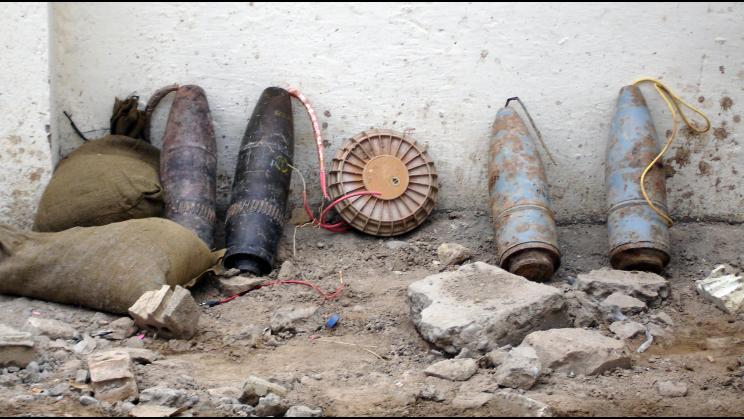 |
| |
| Launch of story map on anti-vehicle mines |
| SIPRI, together with the Geneva International Centre for Humanitarian Demining this month released a new story map, ‘Twisted Metal, Broken Bodies’, as part of the GICHD–SIPRI project on the humanitarian and developmental impact of anti-vehicle mines (AVMs). |
| Explore the story map | Read more about the AVM project |
|
|
|
| COMMENTARY |
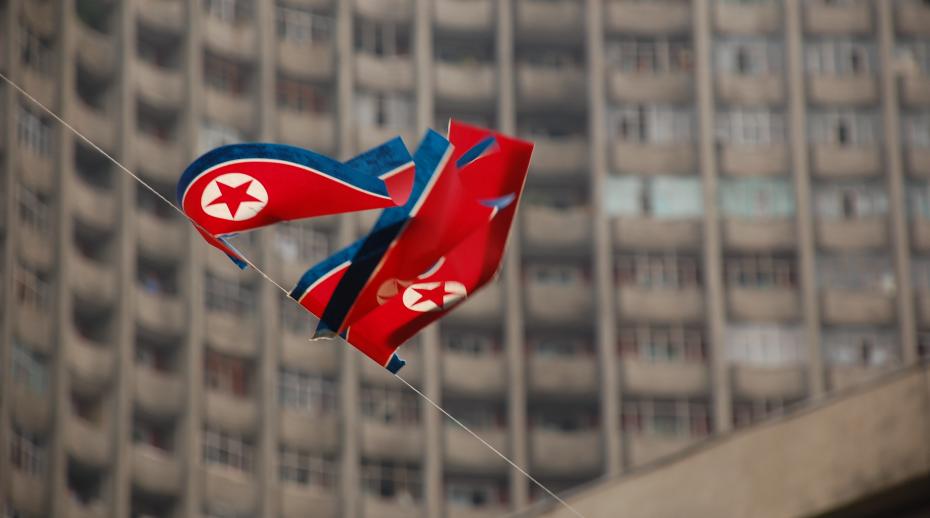 |
| North Korea's sixth nuclear test: What do we know so far? |
| North Korea conducted its sixth nuclear test on 3 September 2017. Robert Kelley provides analysis, taking a look at what we know so far. |
| Read the expert comment |
|
|
| |
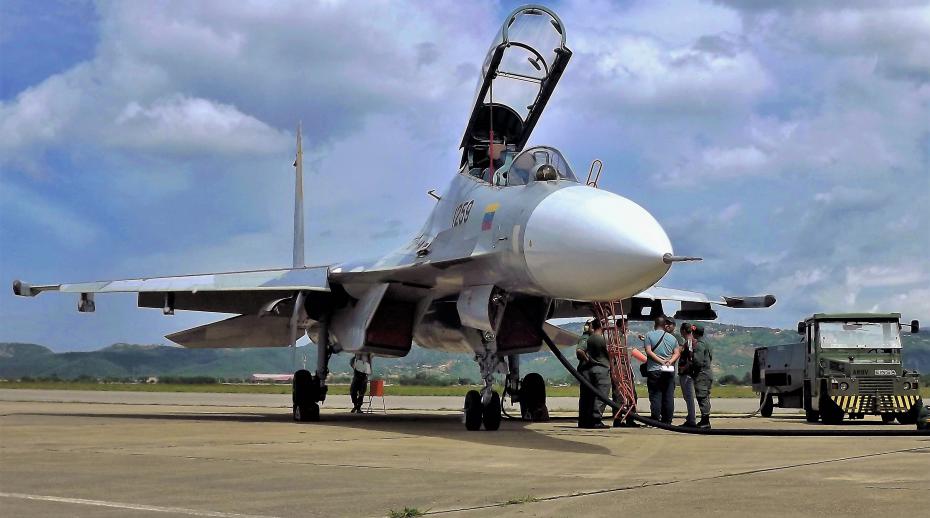 |
| Improving South American military expenditure data |
| Off-budget expenditure is used to fund a large proportion of the arms purchases not captured in the current military expenditure data on South American countries. This backgrounder begins to address this issue, using Venezuela as the initial country case for improvement. |
| Read the backgrounder |
|
|
| |
 |
| The unfolding humanitarian crisis around Lake Chad: UN report falls short of naming environmental dimensions |
| Commenting on the newly launched Report of the Secretary-General on the situation in the Lake Chad Basin region, Florian Krampe argues that the report would have been stronger if it had highlighted the underlying environmental contributions of the region’s fragility. |
| Read the expert comment |
|
|
| |
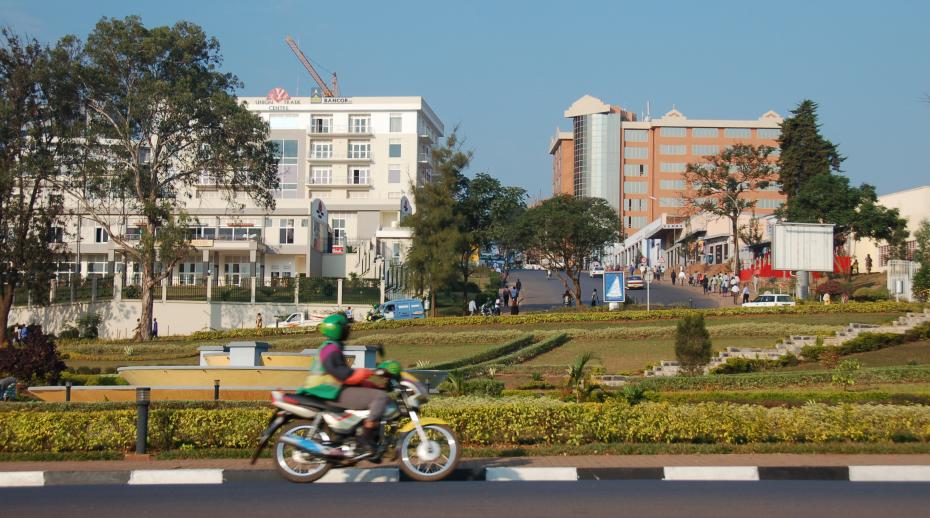 |
| Ounces of prevention, pounds of cure |
| As the United Nations and World Bank prepare to launch a joint study on preventing violent conflict, Gary Milante and Hannes Mueller make the case for preventive action, looking at its overall cost benefit as compared with conflict response. |
| Read the WritePeace blog |
|
|
|
| UPCOMING EVENTS |
| |
| 30–31 October 2017 |
| Global Meeting on Research-Informed Social Cohesion Programming and Policy Development |
| SIPRI will co-host a two-day meeting with the United Nations Development Programme that will gather global researchers and practitioners to share experiences in social cohesion research and programming, discuss latest research and understand research gaps from the perspective of practitioners. Please contact Damir Esenaliev (esenaliev@sipri.org) for further details. |
| |
|
|
| RECENT EVENTS |
| |
| 20–21 September 2017 |
| Article 36 Conference |
| The Article 36 Reviews and Emerging Technologies conference—hosted by SIPRI and in partnership with the Swedish Ministry for Foreign Affairs, the Dutch Ministry of Foreign Affairs and the Canadian Department of National Defence—provided relevant practitioners and civil society experts with an opportunity to learn about new technologies; discuss the technical, legal and operational issues raised by emerging technologies in the context of Article 36 reviews; and identify concrete solutions to help to strengthen compliance with the requirement of Article 36. |
| Read more |
|
| |
| |
| 26 September 2017 |
| Addressing climate fragility risks: What works? |
| As part of Debating Security Plus 2017 (26–28 September), SIPRI Researcher Florian Krampe moderated a discussion session on climate fragility. Participants shared their own experiences to enable direct learning of what works to successfully address the complex and overlapping risks that relate to climate change, livelihood insecurity and conflict. Please contact Florian Krampe (florian.krampe@sipri.org) for further details. |
| |
|
|
| PUBLICATIONS |
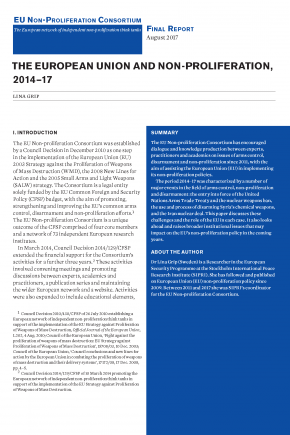 |
| The European Union and Non-proliferation, 2014–17 |
| The period 2014–17 was characterized by a number of major events in the field of arms control, non-proliferation and disarmament: the entry into force of the United Nations Arms Trade Treaty, the passing of the Treaty on the Prohibition of Nuclear Weapons (the Nuclear Weapon Ban Treaty), international efforts to confirm that Syria has fully declared its chemical weapons programme and is not using such weapons, and the Iran nuclear deal. This paper discusses these challenges and the role of the EU in each case. It also looks ahead and raises broader institutional issues that may impact the EU’s non-proliferation policy in the coming years. |
| Read the publication |
|
|
| |
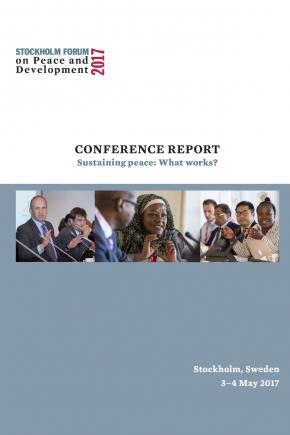 |
| Conference Report: 2017 Stockholm Forum on Peace and Development |
| SIPRI and the Swedish Ministry for Foreign Affairs hosted the fourth annual Stockholm Forum on Peace and Development in May. This year's Forum focused on 'what works' in preventing conflict and sustaining peace, with participants sharing practices and experiences from different contexts. This report summarizes key takeaways as well as recommendations and next steps prescribed during individual sessions and select participant reflections. |
| Read the report |
|
|
| |
 |
| Secure Cities: Inclusivity, resilience and safety |
| Drawing on the presentations made at the 2016 Stockholm Security Conference on the theme ‘Secure Cities’, this SIPRI Insights paper argues that the successful development of a city requires the elaboration of an integrated urban security strategy based on the three pillars of inclusivity, resilience and safety. |
| Read the publication |
|
|
| |
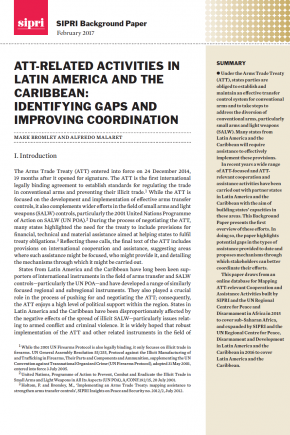 |
| ATT-related activities in Latin America and the Caribbean: Identifying gaps and improving coordination (Spanish translation now available) |
| This paper draws from an online database 'Mapping ATT-relevant Cooperation and Assistance Activities' built by SIPRI and the UN Regional Centre for Peace and Disarmament in Africa in 2015 to cover sub-Saharan Africa, and expanded by SIPRI and the UN Regional Centre for Peace, Disarmament and Development in Latin America and the Caribbean in 2016 to cover Latin America and the Caribbean. |
| Read the publication |
|
|
| |
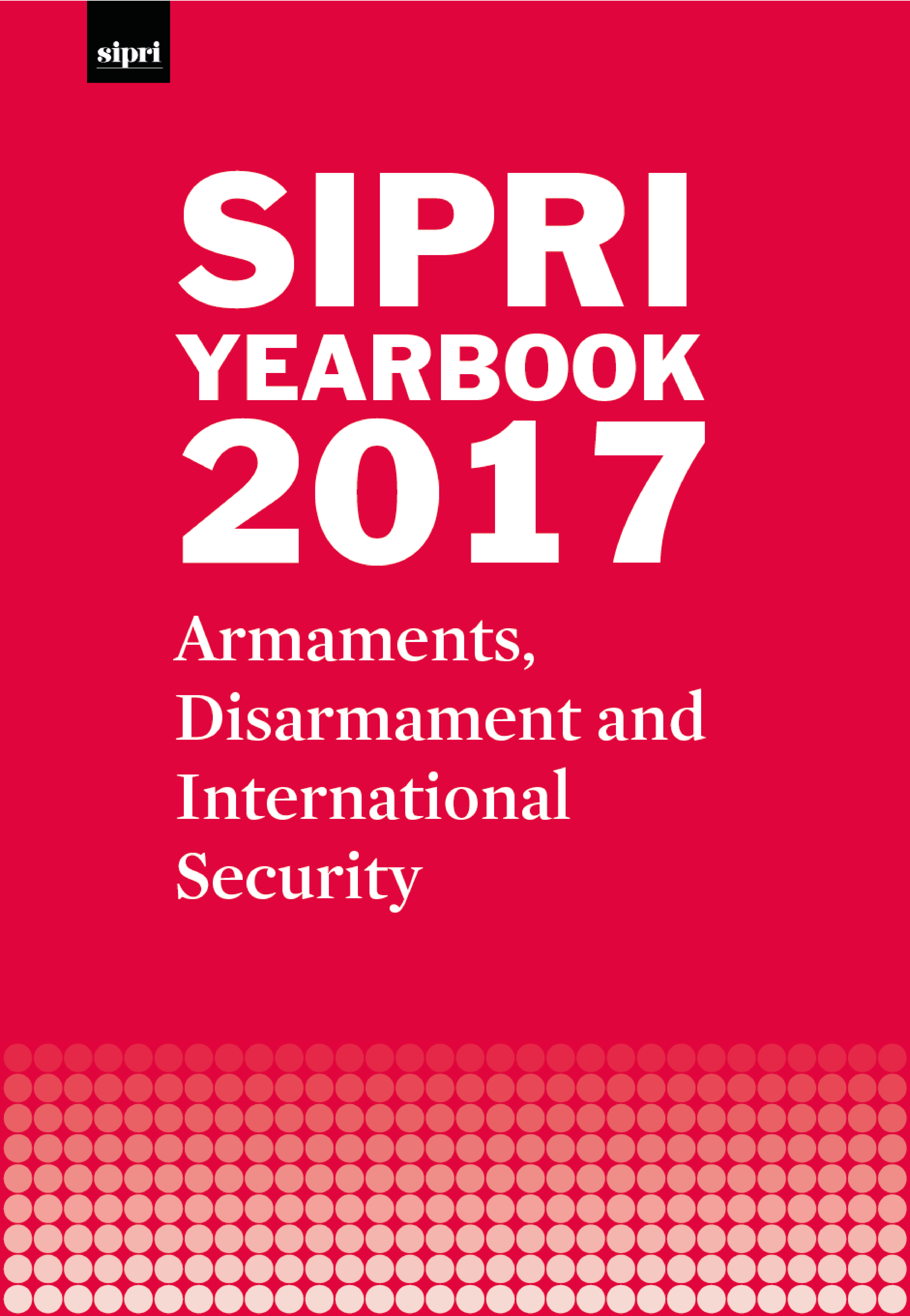 |
| SIPRI Yearbook 2017 |
The 48th edition of the SIPRI Yearbook is a compendium of data and analysis in the areas of security and conflicts; military spending and armaments; and non-proliferation, arms control and disarmament. It covers developments during 2016, including:
- aspects of the conflicts in the Middle East and North Africa;
- the peace agreement in Colombia;
- forced displacement in fragile contexts; and
- the sustaining peace framework of the United Nations.
|
| Browse the contents page | Read the summary (pdf) |
|
|
| |
Contact SIPRI by email: sipri@sipri.org; telephone: +46 8 655 97 00;
or post: SIPRI, Signalistgatan 9, SE-169 72 Solna, Sweden.
This message was sent to [agnEMAIL].
If you would prefer not to receive emails from SIPRI, simply unsubscribe. |
|